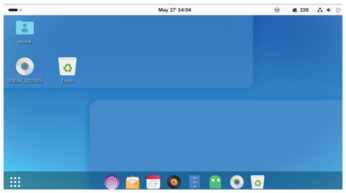Another approach to Arch Linux
Labor of Love

© Photo by Michael Fenton on Unsplash
SDesk aspires to be the Fedora of Arch Linux. We talk to Stephen Byrne about his passion project.
These days, distributions are large-scale projects. Major distributions such as Debian and Fedora are often the size of medium-sized corporations, with dozens of middle management roles, thousands of contributors, and well-developed methodologies. By contrast, SDesk [1] is reminiscent of the earliest days of free software, when distributions were often a labor of love for a single developer. Based on Arch Linux, SDesk is full of individual small design choices, including the option to add parental controls to an account during installation, the Marwaita icons and themes, Gnome extensions enabled by a single click, and the default Swirl Web Browser. Many of SDesk's idiosyncratic choices are enhancements to Arch Linux, such as the inclusion of SELinux. Here, Stephen Byrne, SDesk's developer, talks about his ongoing solo project.
Linux Magazine (LM): Tell readers about yourself and your involvement with free/open source software.
[...]
Buy this article as PDF
(incl. VAT)
Buy Linux Magazine
Subscribe to our Linux Newsletters
Find Linux and Open Source Jobs
Subscribe to our ADMIN Newsletters
Support Our Work
Linux Magazine content is made possible with support from readers like you. Please consider contributing when you’ve found an article to be beneficial.

News
-
Introducing matrixOS, an Immutable Gentoo-Based Linux Distro
It was only a matter of time before a developer decided one of the most challenging Linux distributions needed to be immutable.
-
Chaos Comes to KDE in KaOS
KaOS devs are making a major change to the distribution, and it all comes down to one system.
-
New Linux Botnet Discovered
The SSHStalker botnet uses IRC C2 to control systems via legacy Linux kernel exploits.
-
The Next Linux Kernel Turns 7.0
Linus Torvalds has announced that after Linux kernel 6.19, we'll finally reach the 7.0 iteration stage.
-
Linux From Scratch Drops SysVinit Support
LFS will no longer support SysVinit.
-
LibreOffice 26.2 Now Available
With new features, improvements, and bug fixes, LibreOffice 26.2 delivers a modern, polished office suite without compromise.
-
Linux Kernel Project Releases Project Continuity Document
What happens to Linux when there's no Linus? It's a question many of us have asked over the years, and it seems it's also on the minds of the Linux kernel project.
-
Mecha Systems Introduces Linux Handheld
Mecha Systems has revealed its Mecha Comet, a new handheld computer powered by – you guessed it – Linux.
-
MX Linux 25.1 Features Dual Init System ISO
The latest release of MX Linux caters to lovers of two different init systems and even offers instructions on how to transition.
-
Photoshop on Linux?
A developer has patched Wine so that it'll run specific versions of Photoshop that depend on Adobe Creative Cloud.

